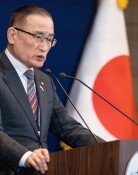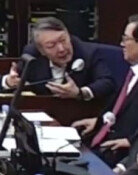Gov`t Inaction also Brewed Turmoil Over American Beef
Gov`t Inaction also Brewed Turmoil Over American Beef
Posted May. 08, 2008 08:27,
Most Koreans do not dispute the fact that the rumors over mad cow disease and the import of U.S. beef are exaggerated. These rumors are surfacing around the nation via Internet and text messages.
Also, no one disputes that decisions about the food that our people eat should be made prudently. But the irrational rumors have crossed a line, due to some radicals in the country. The vast majority of scholars and Koreans believe that the radicals, in coordination with nationalistic liberals, are fanning irrational fears to deprive the Lee Myung-bak administration of the publics trust.
But the blame for the unrest is not solely attributable to radicals and nationalistic liberals. The administration should have responded to increasing fears and concerns over U.S. beef imports. In other words, the situation got worse because of a lukewarm and belated response and the inability of the government to contain the over-reaction.
○ Ministries Sit on Their Hands
Social turmoil surrounding the import of American beef was sparked by MBCs PD Notes, a Korean news program similar to 60 Minutes. The news program brewed fears about beef in its April 29 episode. Scholars and scientists have not reached a definitive agreement on the correlation between mad cow disease and human contamination. But the news program highlighted scientifically unproven opinions of a minority of scholars, leaving viewers with the impression that the consumption of American beef was liken to submission to mad cow disease. Now, reasonable citizens criticize the TV station and the program for their irresponsible action.
After the program was aired, absurd and emotional rumors began passing over the Internet. Some of them were sound, but most of them were hyped.
Even so, the Lee administration sat on its hands, doing little. The Ministry of Food, Agriculture, Forestry and Fisheries, for example, belatedly filed a claim, on Tuesday, with the Press Arbitration Commission against the program. Whatever the arbitration commissions decision, the administration cannot avoid the criticism that its silence, on what it believed was a totally absurd allegation, was interpreted by the public as tacit approval.
Along with the Agriculture Ministry, the Health and Welfare Ministry and the Korea Centers for Disease Control and Prevention also have jurisdiction and duties over the disease and relevant matters. Amid allegations that Koreans are more susceptible to the disease, the two agencies did nothing, falsely believing that Korea-U.S. beef negotiations, not the disease itself, was at the center of the issue.
The Dong-A Ilbo first covered the rumors and the rising social turmoil back on May 1. Following our footsteps, other major newspapers addressed the issue in their articles and editorials. Only then did authorities begin to realize the gravity of the situation.
On May 2, the administration held the first open forum explaining that the paper quoted by MBC was not about Koreans vulnerability to mad cow disease. But again, the authorities did not explain why in detail. Three days later, the disease control center posted the entire paper in question, explaining that the broadcasting company distorted the facts.
Likewise, the Agriculture Ministry belatedly posted a 10 Most Asked Questions About Mad Cow Disease notice on its homepage on Tuesday. Numerous other examples illustrate how badly the government botched up its public relations initiatives.
After the May 4 meeting of senior presidential aides, government officials and ruling Grand National Party members, a GNP member who attended the meeting said, Tomorrow, the Agriculture Ministry will announce a series of counter-measures. Contrary to the announcement, however, the ministry denied that it would announce any plans at all. Then, on the following day, the ministry said that it would dispatch inspectors to the United States.
○ Total Loss of Control
Koreans point their fingers at the irresponsibility of the Education Ministry.
Rumors about the May 17 organized walkout from class flared up among K-12 students, causing massive confusion. But the ministry did not do anything until yesterday, when it convened a meeting with local educational authorities. All the ministry did at the end of the meeting was to repeat the mantra that it would engage itself more aggressively in the matter and help students correctly understand the issue. Furthermore, the Ministry of Culture, Sports and Tourism, which is in charge of public relations, is under fire for its failure to contain the raging rumors, despite repeated promises to swiftly process the publics opinion to prepare counter-measures.
Many fingers also point at Cheong Wa Dae.
A senior presidential aide confessed, We did not envisage it would spread this fast and have such a devastating effect. Another Cheong Wa Dae official noted, We were blind to the problem until the newspapers directed us to the many problems caused by the rumors.
The presidential secretariat for economic affairs, which was to handle the matter, was focused on rising grain and feed prices. The presidential secretariats for political affairs and civil affairs did not pay attention to public opinions and reactions, either.
Only after newspapers highlighted the problems and effects of the rumors on the Internet and via text messages did the presidential office initiate online public hearings on major portal sites yesterday afternoon to answer questions in real time.






![[사설]참 구차한 김병기 전 원내대표](https://dimg.donga.com/c/138/175/90/1/wps/NEWS/IMAGE/2026/01/13/133151454.1.jpg)
